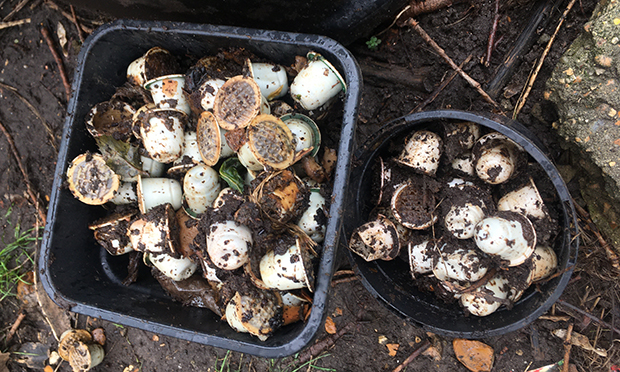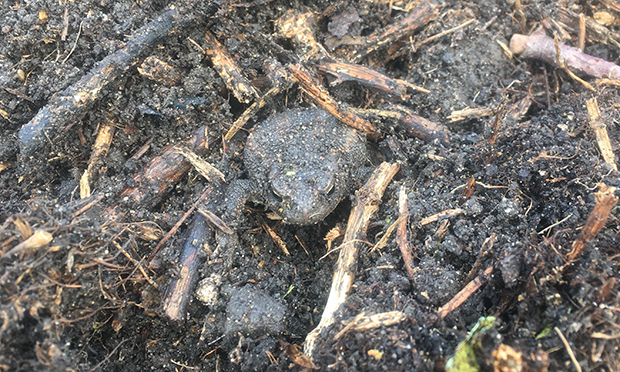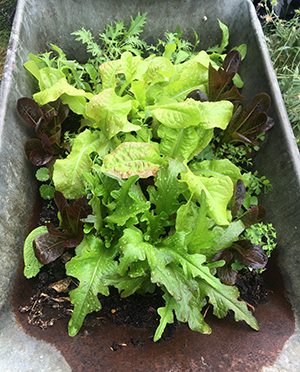The Citizen Gardener: The Uncompostables

There’s a curious equation being worked out with our rubbish. The less we throw away it seems, the bigger the bin.
The new wheelie bins being rolled out across the borough have been a major talking point on the streets as we move to fortnightly collections. It’s good that we are encouraged to throw away less waste and I am a champion of recycling and composting of course.
Compost is sometimes described as a treasure chest, black gold or a black jewel as it’s so valuable to the garden. It can improve your soil’s structure, increase yield by providing nutrients and the ability of the soil to retain moisture and oxygen. It makes your plants more resilient and able to combat disease. And kitchen compost (made up mostly from vegetables) has a particularly high nutrient value, generally containing lots of nitrogen – good for leafy vegetables.
We can all compost – and we always have. It doesn’t have to be complicated, either. A bucket on your balcony can work as a compost bin and you can use the compost on house plants.
If you’re composting at home, stick to vegetable waste – no dairy or meat for example – unless you’ve got a hot bin, which creates high temperatures to break organic material down quickly and, in theory, the new bioplastics made from plants. You can find out more about hot bins at hotbincomposting.com.
But there are some little porkie pies (only compostable in a hot bin of course) being wheeled out by manufacturers of biodegradeable plastics suggesting we can compost more than is actually possible.

I am cheered to know when I drink out of a one-use coffee cup that says it’s compostable. Good, I think, I don’t have to worry about that going into landfill or ending up in the sea. Sometimes I take the cup home to avoid it going into a bin and compost it if it says it’s compostable. I’m cheered, too, that there are so many alternatives to fossil-based plastic – polymers derived from plants and designed to biodegrade – in everyday single-use products.
Although compostable plastics are biodegradable, not all biodegradable plastics are compostable. I’ve discovered that many of these biodegradeable items won’t compost – or at least not at home. They need an industrial anaerobic process (no oxygen) and high temperatures to break down. Our home compost bins are aerobic (with oxygen) and just won’t get hot enough to break these products down except over many years.
As this is the time of year for ‘turning’ compost (and beware frogs and toads sheltering in it), it’s a good time to examine what has actually degraded.
A neighbour adds to my compost and checked that the coffee pods he uses every day were compostable. They said they were. They aren’t. They are almost completely intact after more than a year.
University College London (UCL) has been doing some research into these plant-based plastics which claim to be compostable with a citizen science experiment (bigcompostexperiment.org.uk). They found that 69 per cent of ‘compostable’ plastic was ‘entirely intact or partially degraded’ after several months.

Fellow gardener Steph Steele (twitter.com/01010011STEELE) notes that not only is much of the ‘vegware’ not breaking down, but we need to keep an eye on the energy and land use needed to make these alternative products.
UCL, too, cautions that we need to think about the whole life cycle of these products to create less damaging systems. They say: “It is important to consider the whole life cycle and environmental impacts of compostable plastics in order to assess their suitability for use. Life Cycle Assessment (LCA) is a scientific methodology for assessing environmental impacts and/or costs associated with all the stages of the life cycle of a product, process, or service.”
Well, we, as individuals can’t do that. It’s up to the government and councils to make the system work better, but at the moment the infrastructure isn’t keeping up with the technology.
Despite the technological advances in plant-based or ‘bio’ plastics, it turns out we can’t put them in the recycling bin either. It has to go into the general waste.
This is from the council’s website: “Compostable plastic should be put into your general waste and not your food waste or garden waste. This is because in north London food waste is processed in anaerobic digestion (AD) facilities and mixed food and garden waste goes to in-vessel composting (IVC) facilities. All packaging (compostable liners/vegware/plastic bags) is removed from food and garden waste by ‘de-packaging’ machinery and disposed of. This has to be done because non-compostable items are often put into the food/garden waste when they shouldn’t be, causing contamination. The de-packaging machinery we use is not currently able to distinguish between compostable and non- compostable packaging when removing contaminants.”
So, if it’s not home compostable and can’t be put in our food waste bins, it’s ending up in landfill. Grr.
In other news, at least Spring is coming!
Kate Poland is an award-winning community gardener and the UK’s first ever postcode gardener in E5. For more, head to cordwainersgrow.org.uk and friendsoftheearth.uk
